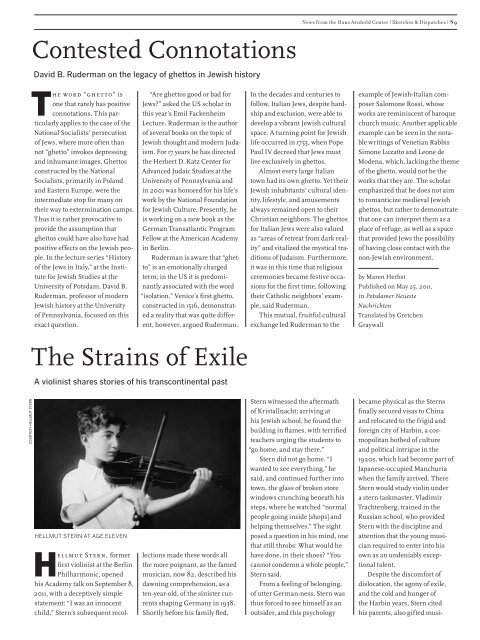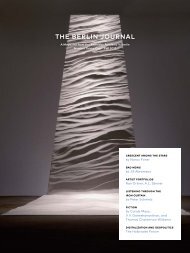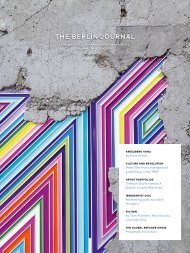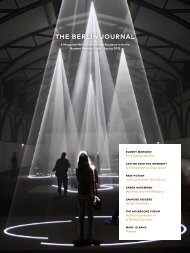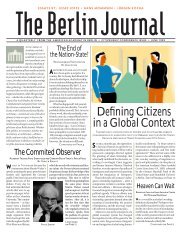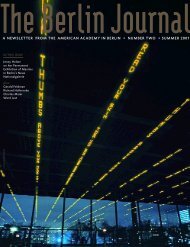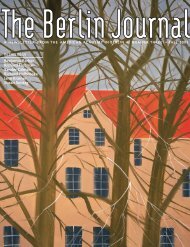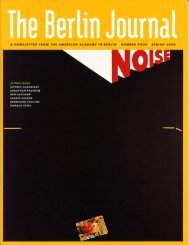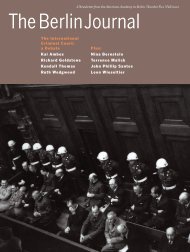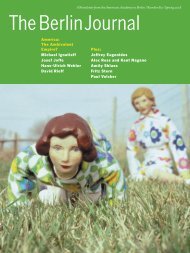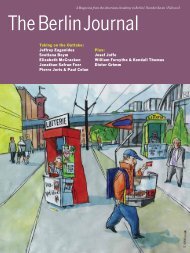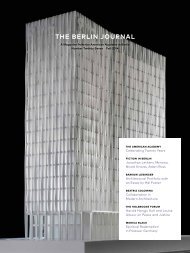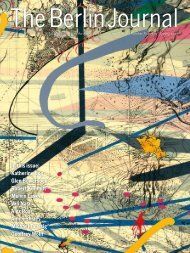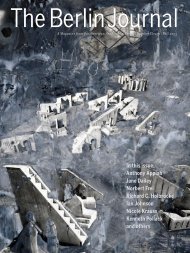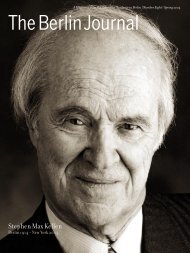Fall 2011 | Issue 21
- No tags were found...
Create successful ePaper yourself
Turn your PDF publications into a flip-book with our unique Google optimized e-Paper software.
Contested Connotations<br />
David B. Ruderman on the legacy of ghettos in Jewish history<br />
News from the Hans Arnhold Center | Sketches & Dispatches | N9<br />
The word “ghetto” is<br />
one that rarely has positive<br />
connotations. This particularly<br />
applies to the case of the<br />
National Socialists’ persecution<br />
of Jews, where more often than<br />
not “ghetto” invokes depressing<br />
and inhumane images. Ghettos<br />
constructed by the National<br />
Socialists, primarily in Poland<br />
and Eastern Europe, were the<br />
intermediate stop for many on<br />
their way to extermination camps.<br />
Thus it is rather provocative to<br />
provide the assumption that<br />
ghettos could have also have had<br />
positive effects on the Jewish people.<br />
In the lecture series “History<br />
of the Jews in Italy,” at the Institute<br />
for Jewish Studies at the<br />
University of Potsdam, David B.<br />
Ruderman, professor of modern<br />
Jewish history at the University<br />
of Pennsylvania, focused on this<br />
exact question.<br />
“Are ghettos good or bad for<br />
Jews?” asked the US scholar in<br />
this year’s Emil Fackenheim<br />
Lecture. Ruderman is the author<br />
of several books on the topic of<br />
Jewish thought and modern Judaism.<br />
For 17 years he has directed<br />
the Herbert D. Katz Center for<br />
Advanced Judaic Studies at the<br />
University of Pennsylvania and<br />
in 2001 was honored for his life’s<br />
work by the National Foundation<br />
for Jewish Culture. Presently, he<br />
is working on a new book as the<br />
German Transatlantic Program<br />
Fellow at the American Academy<br />
in Berlin.<br />
Ruderman is aware that “ghetto”<br />
is an emotionally charged<br />
term; in the US it is predominantly<br />
associated with the word<br />
“isolation.” Venice’s first ghetto,<br />
constructed in 1516, demonstrated<br />
a reality that was quite different,<br />
however, argued Ruderman.<br />
In the decades and centuries to<br />
follow, Italian Jews, despite hardship<br />
and exclusion, were able to<br />
develop a vibrant Jewish cultural<br />
space. A turning point for Jewish<br />
life occurred in 1755, when Pope<br />
Paul IV decreed that Jews must<br />
live exclusively in ghettos.<br />
Almost every large Italian<br />
town had its own ghetto. Yet their<br />
Jewish inhabitants’ cultural identity,<br />
lifestyle, and amusements<br />
always remained open to their<br />
Christian neighbors. The ghettos<br />
for Italian Jews were also valued<br />
as “areas of retreat from dark reality”<br />
and vitalized the mystical traditions<br />
of Judaism. Furthermore,<br />
it was in this time that religious<br />
ceremonies became festive occasions<br />
for the first time, following<br />
their Catholic neighbors’ example,<br />
said Ruderman.<br />
This mutual, fruitful cultural<br />
exchange led Ruderman to the<br />
example of Jewish-Italian composer<br />
Salomone Rossi, whose<br />
works are reminiscent of baroque<br />
church music. Another applicable<br />
example can be seen in the notable<br />
writings of Venetian Rabbis<br />
Simone Luzatto and Leone de<br />
Modena, which, lacking the theme<br />
of the ghetto, would not be the<br />
works that they are. The scholar<br />
emphasized that he does not aim<br />
to romanticize medieval Jewish<br />
ghettos, but rather to demonstrate<br />
that one can interpret them as a<br />
place of refuge, as well as a space<br />
that provided Jews the possibility<br />
of having close contact with the<br />
non-Jewish environment.<br />
by Maren Herbst<br />
Published on May 25, <strong>2011</strong>,<br />
in Potsdamer Neueste<br />
Nachrichten<br />
Translated by Gretchen<br />
Graywall<br />
The Strains of Exile<br />
A violinist shares stories of his transcontinental past<br />
COURTESY HELLMUT STERN<br />
HELLMUT STERN AT AGE ELEVEN<br />
Hellmut Stern, former<br />
first violinist at the Berlin<br />
Philharmonic, opened<br />
his Academy talk on September 8,<br />
<strong>2011</strong>, with a deceptively simple<br />
statement: “I was an innocent<br />
child.” Stern’s subsequent recol-<br />
lections made these words all<br />
the more poignant, as the famed<br />
musician, now 82, described his<br />
dawning comprehension, as a<br />
ten-year-old, of the sinister currents<br />
shaping Germany in 1938.<br />
Shortly before his family fled,<br />
Stern witnessed the aftermath<br />
of Kristallnacht; arriving at<br />
his Jewish school, he found the<br />
building in flames, with terrified<br />
teachers urging the students to<br />
“go home, and stay there.”<br />
Stern did not go home. “I<br />
wanted to see everything,” he<br />
said, and continued further into<br />
town, the glass of broken store<br />
windows crunching beneath his<br />
steps, where he watched “normal<br />
people going inside [shops] and<br />
helping themselves.” The sight<br />
posed a question in his mind, one<br />
that still throbs: What would he<br />
have done, in their shoes? “You<br />
cannot condemn a whole people,”<br />
Stern said.<br />
From a feeling of belonging,<br />
of utter German-ness, Stern was<br />
thus forced to see himself as an<br />
outsider, and this psychology<br />
became physical as the Sterns<br />
finally secured visas to China<br />
and relocated to the frigid and<br />
foreign city of Harbin, a cosmopolitan<br />
hotbed of culture<br />
and political intrigue in the<br />
1920s, which had become part of<br />
Japanese-occupied Manchuria<br />
when the family arrived. There<br />
Stern would study violin under<br />
a stern taskmaster, Vladimir<br />
Trachtenberg, trained in the<br />
Russian school, who provided<br />
Stern with the discipline and<br />
attention that the young musician<br />
required to enter into his<br />
own as an undeniably exceptional<br />
talent.<br />
Despite the discomfort of<br />
dislocation, the agony of exile,<br />
and the cold and hunger of<br />
the Harbin years, Stern cited<br />
his parents, also gifted musi-


